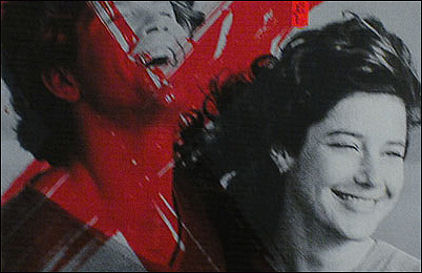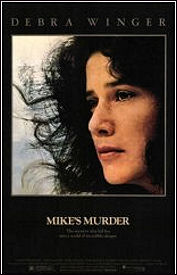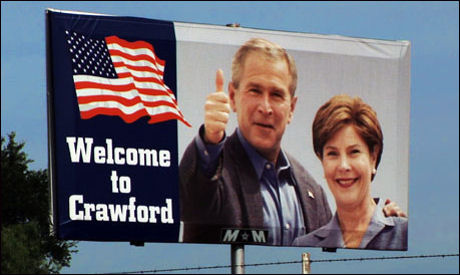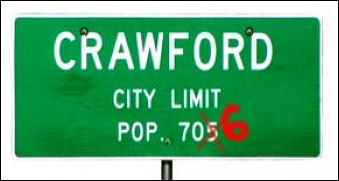Like me, N.Y. Times columnist Maureen Dowd has come to feel that somehow, some way Barack Obama needs to strap on the shootin’ irons like Gary Cooper and go out and face the cigar-chomping Ma Clinton and her gang of cutthroat spinners. In ten words, “You can’t be elected president unless you prove you’re tough.”
Jotting #1: “Obama’s multiculturalism is a selling point with many Democrats. But his impassioned egghead advisers have made his campaign seem not only out of his control, but effete and vaguely foreign — the same unflattering light that doomed Michael Dukakis and John Kerry. ”
Jotting #2: “It has taken Obama a year to start seriously rebutting Hillary’s risible claim that she has far more national security experience than he does. Having a first lady tea in Belfast is not equivalent to bringing peace to Northern Ireland.”
Jotting #3: “Obama sounded whiny after his losses, chastising reporters on his plane for asking him hard questions about Goolsbee and Antonin Rezko. Privately, his people conceded that he hadn’t been as fierce about winning as Hillary, once more playing rope-a-dope.”
Jotting #4: “He’s now learned what Hillary learned in Iowa: You can’t cruise to victory on a coronation strategy.”
Day: March 9, 2008
“Mike’s Murder”
The Bank Job‘s somewhat disappointing showing this weekend reminded me again how people don’t seem to support solid, commendable mid-range movies much anymore. 90% of the creme de la creme Rotten Tomatoes gang gave it a thumb’s up, and the impact was negligible. For reasons that may seem to defy precise linkage, this reminded me this morning of Mike’s Murder, a haunting James Bridges drama that didn’t sell enough tickets either when it opened in March 1984.

And yet it gets better in my head the more I think back on it. Which I do from time to time.
I’m mentioning Mike’s Murder because, like David Jones‘ Betrayal (’83), it was issued eons ago on VHS but is still not on DVD. This situation should be corrected by Warner Home Video. It’s way too good to be buried or shunted aside.
It didn’t register very strongly in the mid-Reagan era because it didn’t shoot for the stratosphere or deliver fierce visceral thrills, which is what audiences seemed to be responding to more and more back then. (The ’70s heyday had drawn to a close, and blunt-impact movies — sci-fi epics, actioners, tits-and-zits comedies — were gaining big- time.) But it handled itself and its subject — the L.A. drug-dealing scene — in a way that was almost deceptively powerful. It’s a somber little creep- out thing.
And it had some unusually penetrating performances from Debra Winger, Paul Winfield, Mark Keyloun (a newcomer at the time who seemed to work mostly on television after Mike’s Murder and who retired from acting in the early ’90s) and Darrell Larson. There was real ache and loneliness in their emoting. Which lent unusual gravity to a story that structurally was only a murder-mystery.
The good things about Mike’s Murder eluded several respected critics when it opened 24 years ago. N.Y. Times critic Vincent Canby didn’t even give it the courtesy of a full- length review when he dealt with it on 3.9.84. Pauline Kael, however, defended it, and I wish I could find at least a fragment of her New Yorker review online. I remember how her review noted that a N.Y. Times TV page editor had written “skip it” in response to an airing of Mike’s Murder on a New York-area station, and Kael saying in response, “Please, don’t skip it.”

Winger plays Betty, a practical minded but lonely bank teller living in Brentwood. She falls for Mike, a light-hearted tennis instructor (Keyloun) who spends a single night with her after a brief flirtation. He’s obviously immature and irresponsible, not returning calls and whatnot, but she can’t let him go. Then after he doesn’t show up for a date, Betty learns to her shock that he’s been slain by drug dealers. And so she decides to assuage her pain by looking into his sordid past to learn what happened, and the journey she takes into the toney, drug-dealing underworld that gives Mike’s Murder its strange, unsettling edge.
An IMDB posting by James Sanford says that Mike’s Murder has “a beautifully evoked, vaguely creepy atmosphere that hangs over every scene….the crime that sets the story in motion remains unsolved at the end, and perhaps that’s how it should be. It’s not important who really killed Mike Chuhutsky, Bridges seems to be saying. Not when it’s so obvious what killed him.”
David Ehrenstein explained the genesis of Mike’s Murder in this ’04 Advocate article.
It’s been over ten years since I’ve seen Mike’s Murder, but I remember three things in particular: (a) the look of immense sadness on Winfield’s face as his character, a wealthy gay man who had a thing for Mike, considers the character flaws that led to the young man’s death, (b) the horrific howl that comes out of Larson, who plays Mike’s not-very-smart best friend, as he’s about to be murdered by thugs for having stolen cocaine from a major dealer who lives in the hills, and (c) a nifty little sequence in the very beginning that shows a hamburger being prepared at Tomy’s on Pico Blvd.
For whatever reason I don’t recall anything about Joe Jackson‘s score. Was it mainly a series of songs with a few stabs at mood and atmosphere? That’s what an online description says but my mind’s a blank.
HE to WHV’s Ned Price and George Feltenstein: please do the right thing and issue this film on DVD before too much time elapses.
Media and Fluidity
Boiled down, the theme of Peter Keough‘s “The Medium is the Movie,” a 3.5 Boston Phoenix piece that I stopped reading two thirds of the way through because I didn’t feel a sense of gathering force, is that “reality and truth are fluid, and are dictated by whoever is behind the camera.”
I think we all know that. A more interesting idea, to me, is how the constant streams of fluid media are taking over everything…how fewer and fewer of us seem to live or think or create in organic, three-dimensional, tactile ways or realms.
Cowie also quotes a 1964 Marshall McLuhan line, submitted in Understanding Media: The Extensions of Man, that ‘we have extended our central nervous system itself in a global embrace, abolishing both space and time…we approach the final phase of the extensions of man — the technological simulation of consciousness.’
This “might have sounded a little over the top” 44 years ago, Cowie states, but “not so much now.”
Sunday numbers
10,000 B.C. was projected to earn $32 million yesterday morning, but yesterday’s ticket-sale surge has resulted in a slight adjustment — it’s now expected to earn $35.3 million. The completely repulsive College Road Trip is looking at $13.8 million by tonight as opposed to yesterday’s forecast of $12.5 million. The Bank Job has notched up also — projected to earn a weekend tally of $4,980,000 yesterday, it’s now looking at $5.5 million. (But it should have done better, being far and away the best-quality film to have opened two days ago.)
“Crawford” at SXSW
HE correspondent Moises Chiullan is raving about David Modigliani‘s Crawford, which screened last night at Austin’s South by Southwest. It’s “about much more than the major change felt initially in this small Texas town when George W. Bush first moved there in 2000 a few months before the election,” he writes, “and it’s more than you get out of a trailer or a quote from a friend. In fact, the municipality of Crawford, Texas itself is a lot more than it may seem like at first.

“This movie is more than a chronicle of events and humorous anecdotes, or an examination of what directionsmall-town America went in during these last eight long Bush years. This is a movie about the future, and the film’s relevance is even greater considering the pivotal role of the recent Texas primary and the still-uncertain picture regarding the Democratic nominee.
“The intellectual elite (high-thread-counters, in Hollywood Elsewhere parlance) may have it stuck in their heads that small towns across the country are full of ignorant, tobacco-chewing pro-Bush morons, a complacent idiocracy. Many saw the 2004 election map as straight up red and blue thanks to the arcane effect of the Electoral College on our voting system. But Modigliani’s Crawford presents it as definitely a purple town, and make the case that we’d all be surprised how often this is true in what are considered ‘rural’ communities.
“The Crawford locals portrayed in the film include a woman who owns a Bush merchandise shop and a Baptist preacher who prays for the day Bush will visit his church, expected types you’d see in ‘Bush Country.’ They also count among them anti-war activists who founded a Peace House and kids who completely defy the stereotype of their small town by not ‘chewing grass and wearing boots.’
“There are good ol’ boys who as ‘good ole’ as they come but don’t fall in line with the crap others buy on Fox News each night. They know Bush only gets outside with a chainsaw to get at some cedar trees when there are cameras on him and they wish he’d pick up more of his trash.

“A more important examination is the town’s rise and fall, evinced in the 74 minutes that the film runs.
“The beginning of the Bush years in Crawford begins a local economic boom. Every storefront on the main street is rented, and the town’s former glory many recall comes back. As the years wear on, we approach the point where the country began to implode, and once it does, it’s kind of surprising how bad things turn out until you remind yourself that George W. Bush invaded Crawford before Afghanistan or Iraq.
“For me, the most pivotal story and relationship present in the film is shared by Misti Turbeville (a progressive, liberal history teacher), and a young man who became one of her pupils during those years named Tom Warlick. Tom went from believing everything he was told to searching out his own truth and standing up for it.
“Tom goes through years of being picked on and emotionally crucified just for having his beliefs. One day he went to school wearing a homemade t-shirt that read ‘America, Your Hands Are Bloody’ listing the military casualties of most of the U.S.’s major wars. I grew up in north Texas. I didn’t make one of those shirts, but I know what just having that opinion is like, and it isn’t pleasant.
“In the film, Warlick leads what I consider to be the epitome of the young ‘examined life’: the kid who does like Walk Whitman urged and tore the pages out of the book of life that offended logic, reason, and decency and blazed his own path. Teachers like Mrs. Turbeville are the reason guys like him make it through the bullying and the intimidation.
“During a post-screening q & a, Misti remarked she thought Crawford ‘has matured like the nation has matured,’ which I took to mean that whether or not everyone is more open to the idea of thinking about and doing things differently, they know it’s time for the new direction toward progress that Tom represents.
“I’ll say that you should take care reading other reviews that may ruin seeing the movie yourself. This is a movie that should not be spoiled for anyone.”
